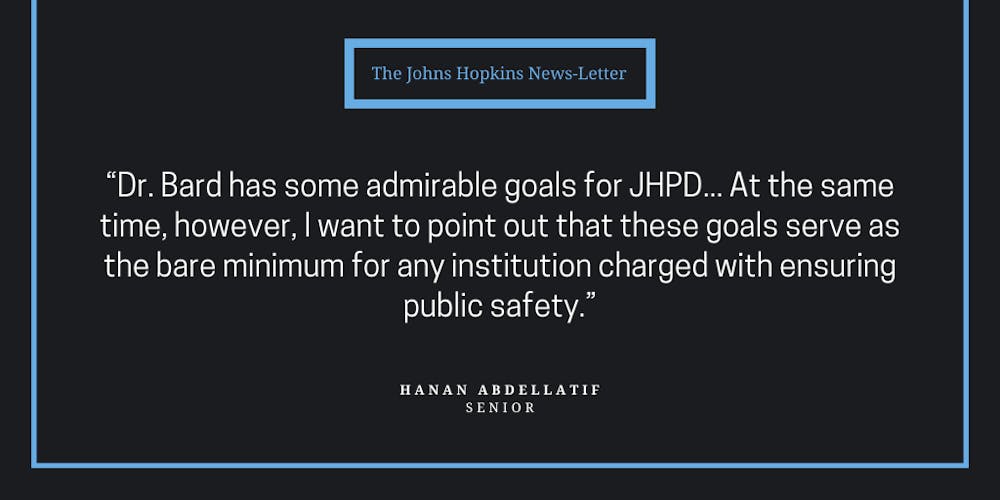The University announced the appointment of Branville Bard Jr., the current vice president of public safety, as chief of police of the Johns Hopkins Police Department (JHPD) in an email to University affiliates on April 20.
In the email, President Ronald J. Daniels, Interim Dean of the Medical Faculty Theodore DeWeese and President of the Hopkins Health System Kevin W. Sowers highlighted Bard’s dedication to the community as vice president of public safety. In addition, they drew attention to his role in creating the Innovation Fund for Community Safety and the Behavioral Health Crisis Support Team and his prior experience working within multiple police departments.
"Bard spent 24 years working for his hometown Philadelphia Police Department, where he led the city's largest police district, and later served as chief of the Philadelphia Housing Authority Police Department,” they wrote. “He subsequently served as the police commissioner of Cambridge, [Mass.].”
The email also emphasized Bard’s academic credentials, noting that he holds a doctorate in public administration and master’s degrees in criminal justice and public safety management.
In an email to The News-Letter, Assistant Vice President for Media Relations and News J.B. Bird elaborated on the reasoning behind Bard’s selection.
“Dr. Bard was selected based on his outstanding performance in the role of vice president for public safety over the past year and a half, his highly relevant experience, particularly in the area of police reform, and the overwhelmingly positive feedback that university leadership has received about his effectiveness and relationship-building within the campus community and beyond,” he wrote. “We believe it will benefit Hopkins to have a single leader, with Dr. Bard's experience and commitment to our community, acting to lead the entire public safety portfolio.”
According to him, students have shared positive feedback in support of Bard’s position.
In an email to The News-Letter, Black Student Union President Jayla Scott asserted that while Bard appears to be an excellent candidate for the role, his belief in the necessity of police has made him unwilling to listen to all perspectives voiced by the community.
“Branville Bard is the ‘perfect’ candidate chief of police of [the University’s] supposedly model police force,” Scott wrote. “He is a racial minority, he has a [doctorate degree] and wrote his dissertation on racial profiling, and he has worked at the University. However, Dr. Bard is 100% pro-police. To him, public safety can’t exist without policing, so no matter what community members, students, staff, and professors say, Dr. Bard will only listen to community feedback, desires, and critique that include a future for police.”
Scott also pointed out that Bard does not have a spotless record when it comes to accountable policing.
“During some of the time he was a captain for Philadelphia police, the police department was under consent decree for unlawful stops,“ they wrote. “In 2018, he defended the use of force in a viral video of a 21-year-old Black Harvard student.”
In an email to University affiliates sent later on April 20, Bard outlined the next steps for the JHPD’s development. These steps include the creation of a JHPD leadership team, the beginning of the process of hiring officers and the drafting of the policies that will guide the JHPD’s routine operations.
Bard’s email noted that the policies will be posted online to ensure transparency.
“In keeping with our commitment to transparency and community partnership, these policies will be provided to the JHPD Accountability Board and posted in draft form on the public safety website starting in late June and continuing through the summer,” he wrote. “All draft policies will be available for a 60-day period of community review and feedback, then finalized to reflect that input and posted publicly by October 1.”
Bard also stressed his desire to engage in dialogue and partnership with the community.
In an email to The News-Letter, senior Hanan Abdellatif noted that this should be a given for any university police department.
“Dr. Bard has some admirable goals for JHPD: community-oriented policing, transparency and accountability, and the maintenance of ‘best practices’ established by nationwide police reform movements,” Abdellatif wrote. “At the same time, however, I want to point out that these goals serve as the bare minimum for any institution charged with ensuring public safety.”
Senior Sarah Sullivan shared her appreciation for Bard’s commitment to community dialogue but questioned the institution of the JHPD in an email to The News-Letter.
“I commend Dr. Bard for aspiring to apply community feedback to the operations of the JHPD,” she wrote. “However, he will be leading an organization built on an administrative conspiracy to purposefully neglect community and student opposition. I don’t understand how he can reconcile that fact with his alleged goals.”
The JHPD has been a source of significant controversy and debate among University affiliates and community members since plans for its development were first announced in 2018. The University put those plans on hold for two years following the 2020 Black Lives Matter protests but resumed implementation late last year.
Sullivan argued that this pause was designed to wait for protesters to graduate.
“The Hopkins administration has made the same claims to students and community members surrounding the creation of the JHPD since I arrived in 2019,” she wrote. “Having observed considerable opposition to the creation of a private police force, the administration opted to delay its plans and wait for student protestors to graduate, effectively avoiding their responsibility to respond to negative input.”
In an interview with The News-Letter, freshman Caitlyn Ramdat expressed concerns about Bard’s appointment. She feels that this serves as another reminder that the development of the JHPD is moving forward without open dialogue in the community.
"Despite the opinions expressed by students in the last couple of years, things are moving forward, and we’re just getting updates on what’s happening without any discussion — there's no input from the public,” she said. “We can’t do anything about it, and that's making it worse.”





